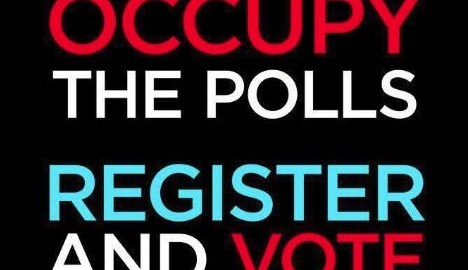Will The 99 Percent Occupy 2012 Elections?

While I voted yesterday, I thought about the Occupy movement. As I cast a “yes” ballot for the right to buy alcoholic beverages on Sundays at package shops in John’s Creek, Georgia, I thought about the many, many years of fighting between political parties that it took to even get this referendum for what is essentially an issue of convenience on the ballot. I wondered what the Occupy movement would look like ten or fifteen years from now, when many of the serious ideas they are putting into play in the political arena will finally be transformed into actionable legislation our elected representatives will have to take votes on.
What does the Occupy movement do between now and then? There will be a long gap between the time the Occupiers leave the streets and the time their demands filter into the system. George Lakoff, one of my favorite political thinkers and one of the hundreds of writers who have signed on to support Occupy Wall Street and the Occupy Movement, has ruminated about this very topic in a new piece he wrote specifically for the Occupiers.
“I was asked weeks ago by some in the Occupy Wall Street movement to make suggestions for how to frame the movement. I have hesitated so far, because I think the movement should be framing itself. It’s a general principle: unless you frame yourself, others—the media, your enemies, your competitors, your well-meaning friends—will frame you.”
“Frames are just structures of thought that we use every day. All words in all languages are defined in terms of frame-circuits in the brain. But ultimately, framing is about ideas, about how we see the world, which determines how we act. In politics, frames are part of competing moral systems that are used in political discourse and in charting political action. In short, framing is a moral enterprise: it says what the character of a movement is. All politics are moral.”
“It seems to me that the OWS movement is moral in nature, that occupiers want the country to change its moral focus. It is easy to find useful policies; hundreds have been suggested. It is harder to find a moral focus and stick to it. If the movement is to frame itself, it should be on the basis of its moral focus, not a particular agenda or list of policy demands.”
“The Public is not opposed to The Private. The Public is what makes The Private possible. And it is what makes freedom possible. Wall Street exists only through public support. It has a moral obligation to direct itself to public needs.”
“Remember: The Tea Party sees itself as stressing only individual responsibility. The Occupation Movement is stressing both individual and social responsibility…The Tea Party solidified the power of the conservative worldview via elections. OWS will have no long-term effect unless it too brings its moral focus to the 2012 elections. Insist on supporting candidates that have your overall moral views, no matter what the local issues are.”
I’m no George Lakoff, who has been researching the power of political language for decades, but I am pretty good at thinking up catchy phrases and buzzwords. Since I’ve always liked the idea behind the period of American history known as Reconstruction, I imagined, as I walked back to my car yesterday after sticking my “I Voted” sticker on my shirt, that if I were an Occupy protestor, I would be sporting a black t-shirt with the phrase “I am a Reconstructor” printed on the front and the phrase “Financial Emancipation from Wall Street manipulation” printed on the back.
That, and a registered voter ID card in my pocket.





